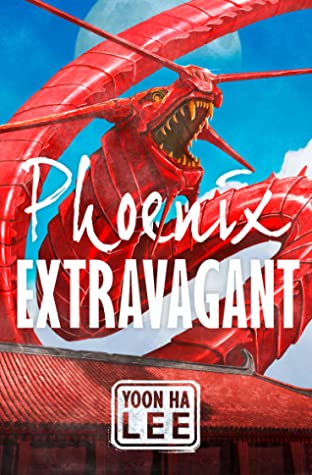Genres: Fantasy, Queer Protagonists
Representation: Characters of Colour, Non-Binary MC, Polyamory (secondary characters), f/f or wlw (secondary characters)
Published on: 9th June 2020
ISBN: 1781087946
Goodreads

For generations the empire has spread across the world, nigh-unstoppable in their advance. Its power depends on its automata, magically animated and programmed with sigils and patterns painted in mystical pigments.
A symbol-painter – themselves a colonial subject – is frustrated in their work when their supply of Phoenix Extravagant dries up, and sets out to find the source. What they’ll discover is darker than anything they could have imagined…
I received this book for free from the publisher via NetGalley in exchange for an honest review. This does not affect my opinion of the book or the content of my review.
Wow. I finished this book just a few minutes ago, and I’m reeling. In the best way! But I’m not at all sure how to describe what I just experienced.
First off, Phoenix Extravagant took me completely by surprise; it was not the book I was expecting. I was incredibly excited when I heard that Lee was writing a fantasy novel, because the creativity demonstrated in his sci-fi is incredible, even though I bounced off those books (I’m not much of a sci-fi reader, and they are pretty heavy sci-fi). So, thinks I, now he’s writing fantasy I have a much better chance of being able to properly appreciate him! Because fantasy is my genre, even when it gets properly weird. This one, I’ll be able to read and be wow-ed by!
And I did! I was! This was much easier to sink into than Ninefox Gambit, and I enjoyed it immensely. But I was expecting the wild, outside-the-box, wildly-inventive creativity of Ninefox, and that’s not what this book is. Or no, that’s not right; it’s that Ninefox is immediately and obviously out there. You can’t miss the fact that it’s like nothing else you’ve ever read, because the alien strangeness is in your face from the first paragraph.
Phoenix Extravagant is also like nothing else I’ve ever read, but in a much subtler way. Superficially, the world and story of PE is fairly recognisable, even standard; the setting is obviously inspired by eastern Asia, and the magic system takes the form of a series of glyphs painted in special inks – it’s very reminiscent of computer code. A few small but delightful details stand out – one of the minor characters is a gumiho, the Korean equivalent of a kitsune, a shapeshifting fox-spirit, and her presence in society is completely normalised, a conceit that delighted me; as did the presence of the Celestials living on the moon, visible going about their lives through telescopes. But for the most part, neither the worldbuilding nor magic system are what makes this story special.
I hardly have the words to explain what it is that makes PE such a heavy hitter. I mean that literally; I don’t know what to call the primary movers and shakers of the story. Cultural forces, maybe? Phoenix Extravagant is like an ocean that is calm on the surface, but has deep and powerful currents running just beneath what’s visible. It’s about the give and take of different cultures, of shifting cultures, of cultural values and those things that are valuable to a culture (not always the same things). It’s about appropriation and assimilation, patriotism versus practicality, conquerors against the conquered. Those are the things powering the plot, driving the story and the characters within it. Those are the things that sweep you up and drag you in and keep you up late at night, turning pages as quickly as you can.
On the surface, this is a story about Jebi, a non-binary/third-gender artist of Hwaguk, a country that was conquered by the Empire of Razan six years before the book opens. Unlike their older sister, Jebi is, if not quite indifferent to Hwaguk’s vassalage, more or less at peace with it: this is the world they live in now, and they mean to succeed in it as best they can. That means paying the substantial fee to register themselves with a Razanei name – Tesserao Tsennan – and applying for a job in the now Razanei-run Ministry of Art, both things their sister Bongsunga would view as betraying their people, and unforgivable. Which is fair enough, given that Bongsunga’s wife died in the war, but Jebi knows that working with/for the Razanei is the only way they’re ever going to be able to support themself, instead of living on Bongsunga’s charity forever.
Through a tricky little knot of events and behind-the-scenes subterfuge, Jebi ends up working for the Ministry of Armor instead of the Ministry of Art, their artistic skills put to use in the creation of Razan’s magically-powered automata – which police the streets – instead of in propaganda posters or the like. And as the book’s blurb states, Jebi discovers the horrible secret behind the creation of the inks the Razanei use to create those automata…
But, see, it’s not the horrible secret you’re probably guessing it is. It’s arguably worse. And I can’t talk about it without giving too big a spoiler, but it’s that unexpected twist that sets the tone for the entire book, the linchpin of the whole story. And I’m so impressed with it, and the way it’s woven through the book, how all those cultural forces I mentioned tangle and twine with each chapter.
This book wasn’t what I expected. I seriously doubt it’s what anyone is expecting, given the blurb it was given, which isn’t lying but is definitely misleading – or possibly lying by omission. But for the best of reasons. If the blurb explained what’s actually going on in PE, it would sound so dull to most readers, and it isn’t. I don’t know that I could spin it in a way that makes it exciting either, but Lee has written it all in a way that’s un-put-downable – not because it’s non-stop action and fight scenes, but because he’s an incredible writer who makes even the slower, quiet moments resound with the reader.
Oh, and there’s a dragon. An utterly fabulous dragon. But I’m willing to bet it’s not the kind of dragon – or character – you’re already expecting it is.
It’s not Pacific Rim. It’s not an anime. But it’s a powerful, deeply moving book that is a wonderful read, without question one of the best of the year. I can’t wait until it’s out so I can talk to other people about it properly!






Leave a Reply